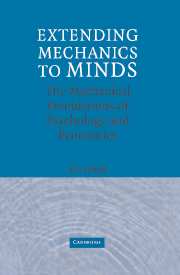Book contents
- Frontmatter
- Contents
- Preface
- Outline of the book
- Part I Reconciling Natural and Mental Philosophy
- Part II Reconstructing Rational Mechanics
- 4 What is mechanics?
- 5 Kinematics
- 6 Dynamics
- 7 The character of mechanical law
- Part III Mechanical Minds
- Part IV The Metaphysics of Mechanics
- Part V Conclusion of the Matter
- System of Notation
- Bibliography
- Index
4 - What is mechanics?
from Part II - Reconstructing Rational Mechanics
Published online by Cambridge University Press: 21 September 2009
- Frontmatter
- Contents
- Preface
- Outline of the book
- Part I Reconciling Natural and Mental Philosophy
- Part II Reconstructing Rational Mechanics
- 4 What is mechanics?
- 5 Kinematics
- 6 Dynamics
- 7 The character of mechanical law
- Part III Mechanical Minds
- Part IV The Metaphysics of Mechanics
- Part V Conclusion of the Matter
- System of Notation
- Bibliography
- Index
Summary
The common picture of mechanics embodies many unfortunate misconceptions about the nature, scope, and structure of mechanics, with many people having the idea that mechanics consists of applying to physical systems the three axioms stated by Newton. Applying mechanics to psychology and economics requires a firmer theoretical basis than that provided by popular misconceptions. To proceed, we thus must confront and set aside mechanical misconceptions, lest the misconceptions prevent proper appreciation of the contribution mechanics makes to understanding the world. Accordingly, the present chapter examines the nature of mechanics at a high level, reconsidering the content and form of mechanical theories in light of the history of mechanical concepts and mathematical formalisms. This examination highlights the common misconceptions and how they divert one from the proper understanding needed for the following development.
Readers wishing to skip this somewhat philosophical discussion in favor of the development of the mechanical axioms themselves might proceed directly to Chapters 5 and 6, which review the structure and content of the axioms of modern rational mechanics. The modern axioms have enjoyed widespread use for decades among mathematicians studying mechanics and among mechanical engineers, although not in beginning physics textbooks. In contrast to the postulates of popular legend, the modern axioms provide a formal characterization of the notion of force, and reveal the true generality of mechanics in ways that usual textbook presentations do not.
- Type
- Chapter
- Information
- Extending Mechanics to MindsThe Mechanical Foundations of Psychology and Economics, pp. 71 - 87Publisher: Cambridge University PressPrint publication year: 2006

